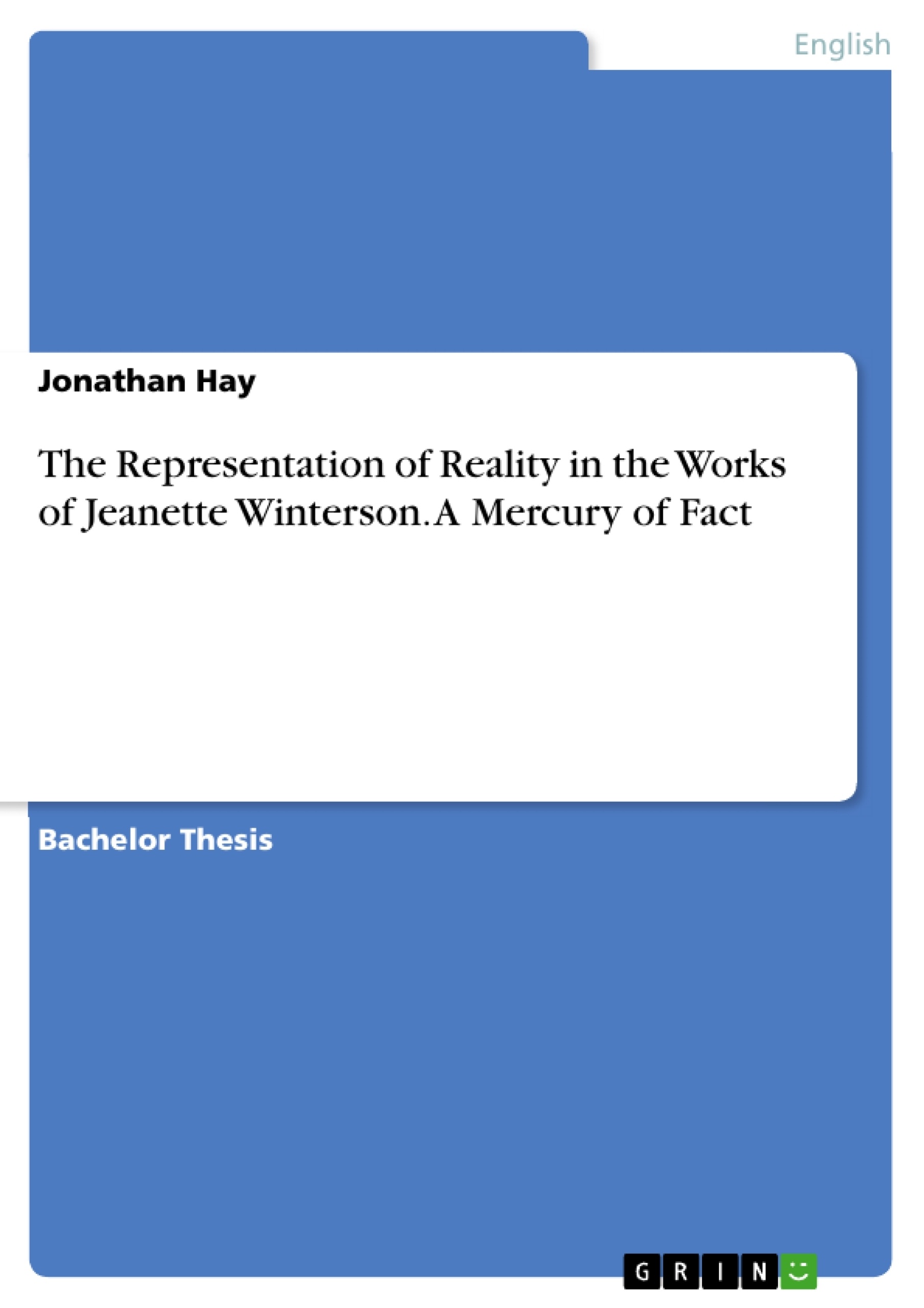This study investigates the way in which Jeanette Winterson's works represent the self and the nature of existence by systematically challenging the authenticity of the construct of reality itself. It lays particular emphasis on the philosophical manner in which Winterson encourages her readers to live their own lives anew, and to learn to manipulate reality to their own ends, through the formation of a self-image which has a predominantly fictional basis.
The introduction to the study establishes the eight primary Wintersonian texts upon which the subsequent analysis centres, before proceeding to consider Winterson’s works in the light of Roland Barthes’ "The Death of the Author". Chapter 1.0 considers the impact of Winterson’s postmodern aesthetic upon her work and her reader, and investigates the specifically linguistic manner in which it forms the foundation of her wider philosophy of the self. Chapter 1.5 analyses Winterson’s memoir, particularly in its subversions of the memoir form, arguing that it is just as fictive as her novels.
Chapter 2.0 analyses Winterson’s works in terms of gender, and investigates the multiple ways in which her works embody a feminist agenda. Chapter 2.5 provides a short analysis focused solely on Winterson’s fitness book "Fit for the Future", and considers how it relates to her feminist agenda more widely. Chapter 3.0 analyses Winterson’s works through philosophical theories of love, arguing that her works privilege love as the ultimate means to attaining self-actualisation.
Inhaltsverzeichnis (Table of Contents)
- Introduction
- Beyond Barthes?
- Chapter 1.0
- ‘A damn good story': Postmodernism
- Chapter 1.5
- 'let's call her Jeanette': Why Be Happy When You Could Be Normal?
- Chapter 2.0
- 'To make an end of it Dark had decided to marry': Gender and Feminism
- Chapter 2.5
- ‘Anyone who fries spinach should be shot': Fit for the Future
- Chapter 3.0
- 'We were not lovers, we were love': Love
- Conclusion
- 'I have no idea what happens next'
Zielsetzung und Themenschwerpunkte (Objectives and Key Themes)
This study examines the representation of self and existence in the works of Jeanette Winterson. It investigates how she challenges the authenticity of reality and encourages readers to construct their own self-identities through a fictional lens, ultimately proposing a philosophy of self-actualization. The study explores how this philosophy manifests in Winterson's various works, including novels, memoirs, and a fitness guide.
- Winterson's postmodern aesthetic and its impact on her work and readers
- The role of fiction in constructing and understanding self-identity
- Gender and feminism in Winterson's works
- The concept of love as a means to attain self-actualization
- The manipulation of reality through self-image and narrative devices
Zusammenfassung der Kapitel (Chapter Summaries)
- Introduction: This section introduces Winterson's philosophy of the self, which posits that defining oneself actively is more empowering than allowing external forces to define one's identity. The introduction outlines the eight key Wintersonian texts that will be analyzed in the study.
- Beyond Barthes?: This chapter explores the impact of Roland Barthes' 'The Death of the Author' on Winterson's work, suggesting that Winterson's texts encourage readers to engage with them on a personal level, allowing them to create their own interpretations.
- Chapter 1.0: This chapter examines the influence of Winterson's postmodern aesthetic on her writing. It investigates how her language and narrative structure form the foundation of her philosophy of the self.
- Chapter 1.5: This chapter analyzes Winterson's memoir, arguing that it is as fictive as her novels. It examines how the memoir subverts conventional expectations of the genre.
- Chapter 2.0: This chapter explores the themes of gender and feminism in Winterson's works, examining how they embody a feminist agenda through various narrative strategies.
- Chapter 2.5: This chapter focuses on Winterson's fitness guide "Fit for the Future," analyzing how it relates to her wider feminist agenda and encourages women to achieve physical and sexual liberation.
- Chapter 3.0: This chapter examines Winterson's works through philosophical theories of love, arguing that her writings privilege love as the ultimate means to attain self-actualization.
Schlüsselwörter (Keywords)
The main keywords and focus topics of this study are: Jeanette Winterson, postmodernism, self-identity, fiction, reality, gender, feminism, love, self-actualization, narrative devices, "The Death of the Author," memoir, "Oranges Are Not the Only Fruit," "Boating for Beginners," "Fit for the Future." These terms encapsulate the primary themes and concepts explored in the analysis of Winterson's works.
Frequently Asked Questions
How does Jeanette Winterson represent reality in her works?
Winterson challenges the authenticity of reality by systematically blending fact and fiction, encouraging readers to see reality as a construct that can be manipulated.
What is the significance of Roland Barthes in this study?
The study explores Winterson's work in light of Barthes' "The Death of the Author," suggesting her texts empower the reader to create their own personal meaning.
Is Winterson's memoir "Why Be Happy When You Could Be Normal?" purely factual?
The analysis argues that her memoir is as fictive as her novels, subverting the traditional memoir form to emphasize the subjective nature of self-identity.
How does Winterson link love to self-actualization?
Winterson privileges love as the ultimate philosophical means to achieve self-actualization, where lovers define themselves through their shared narrative.
What role does gender play in Winterson's philosophy?
Her works embody a feminist agenda, using narrative devices to challenge gender norms and encourage both physical and sexual liberation.
- Quote paper
- Jonathan Hay (Author), 2017, The Representation of Reality in the Works of Jeanette Winterson. A Mercury of Fact, Munich, GRIN Verlag, https://www.grin.com/document/542105



